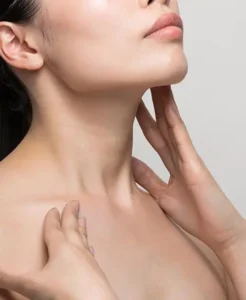Home » Conditions » Bruxism
Bruxism is a disorder affecting 5% of the population. It refers to teeth grinding caused by the involuntary contraction of the masticatory muscles : the masseter and the frontal muscle.
There are two types of bruxism : centered bruxism : characterized by teeth clenching, eccentric bruxism : involving lateral jaw movements.
Bruxism can occur during the day, often triggered by stress or intense concentration, but it is most commonly nocturnal. It may be temporary or persist over time.
In children, bruxism is physiological, serving to facilitate the elimination of baby teeth.
Bruxism, or teeth grinding, is a common issue that can have serious consequences on oral health and the overall well-being of those affected. Recognizing the symptoms of bruxism is essential in order to consider an appropriate treatment. Medical techniques, including Botox injections and
muscle relaxation treatments, are effective options for managing and reducing the effects of bruxism.
This page outlines the causes, symptoms, and treatments of bruxism with the goal of improving the quality of life for patients suffering from this condition.

The exact causes of bruxism remain unknown.

Bruxism is responsible for several disorders and complications.

It is essential to consult a dentist, oral surgeon, or physician if you suspect you suffer from bruxism in order to receive an accurate diagnosis and an appropriate treatment plan. To treat bruxism, a dentist may recommend wearing a dental splint at night to protect the teeth from wear. However, this does not stop muscle contractions.
Relaxation techniques such as hypnosis and sophrology, as well as anxiolytics and muscle relaxants, are often suggested, but they prove ineffective.
The only effective treatment is Botox injections into the masseter and/or temporal muscles, which are responsible for chewing.
Botulinum toxin temporarily blocks the nerve signals that trigger muscle contraction.
Initial consultation
During the first consultation, the doctor assesses the severity of bruxism and examines the jaw muscles.
A discussion about the patient’s medical history and expectations is conducted to establish a tailored treatment plan.
Injection
The treatment area is disinfected.
The Botox is injected directly into the masseter muscles using a fine needle.
The procedure is quick, usually lasting a few minutes, and does not require anesthesia.
Post-treatment
Patients can resume their normal activities immediately after the procedure.
It is recommended to avoid massaging or touching the injected areas for a few hours to allow the Botox to settle properly.
Side effects are minor : as with any injection, mild bruising or sensitivity may occur at the injection site. Some patients may experience temporary muscle weakness in the treated area, leading to mild discomfort while chewing for a few days.
There are no serious complications when Botox is administered by an experienced physician.
The contraindications are the same as for botox injections.
The result of the treatment is not permanent. It lasts six months, and maintenance sessions every six months are necessary to sustain the benefits.
The effect on teeth grinding or clenching appears a few days after the injection.
The slimming effect on the jawline becomes visible one month after the injection and reaches its optimal result after two months
Muscle contraction stops, the lower third of the face appears slimmer (weakened muscles reduce in volume), and the effects of bruxism are corrected. A single session is sufficient.
In Geneva, the treatment of bruxism with botulinum toxin injections into the masseter muscle starts at 600 CHF for the first vial. If additional vials are needed, this will depend on the patient’s muscle strength and facial morphology; each additional vial is charged at 350 CHF. In general, 1 to 3 vials are required to achieve effective and lasting muscle relaxation. The exact number is determined during the initial consultation, based on the intensity of the bruxism and the clinically assessed muscular strength.
What are the main causes of bruxism ?
How does Botox work to treat bruxism ?
How long does the effect of Botox injections for bruxism last ?
What are the possible side effects of Botox injections in the masseter muscles for bruxism ?
Can Botox injections for bruxism affect chewing function or facial expression ?
Is Botox treatment effective for all types of bruxism ?
Are there specific risk factors for developing bruxism ?
Are there precautions to take before and after a Botox injection for bruxism ?
What are the risks of untreated bruxism ?
How to sleep to avoid bruxism ?
When should I consult a doctor for bruxism ?
How many sessions are needed to see improvement in bruxism with Botox ?
What medication for bruxism ?
Can bruxism disappear ?
How can I slim my jawline because of bruxism ?
Certain natural techniques can help reduce bruxism, such as relaxation, yoga or sophrology. Breathing and meditation exercises can also help reduce the stress and anxiety often associated with bruxism.
Bruxism can have an impact on mental health by causing stress, anxiety and sleep disturbances. Bruxism sufferers may feel frustrated by the damage to their teeth and the physical discomfort associated with the condition.
Encouraging good oral hygiene from an early age is essential to prevent bruxism in children. Limiting the consumption of sugary and hard foods, as well as encouraging a relaxing routine before bedtime, can also help reduce the risk of bruxism developing in younger children.
Certain natural practices, such as relaxation techniques, breathing exercises and jaw massage, can help reduce symptoms. However, it is essential to consult a healthcare professional for appropriate treatment.
Bruxism can be associated with sleep disorders such as obstructive sleep apnoea, as well as psychological conditions such as anxiety and depression.
You should consult a healthcare professional if you notice any signs of bruxism, such as jaw pain, frequent headaches or worn teeth. Consultation is also recommended if your partner notices you grinding your teeth while you sleep.
Yes, bruxism can affect children. The causes can be teething pain, allergies or stress factors. Fortunately, bruxism in children is often temporary.
Bruxism is often diagnosed by a dentist during a routine dental check-up. Signs may include worn teeth, tooth fractures and muscle tension in the jaw.
To avoid bruxism during sleep, we recommend :
No, bruxism can also occur during the day. Daytime bruxism is often linked to repetitive behaviours or stressful situations, such as chewing on pens or clenching your teeth while concentrating. It is important to be aware of these habits and to correct them to avoid complications.
Treatment for bruxism often depends on the cause. Here are a few ways of dealing with it.
If you suffer from bruxism, we recommend that you consult the following health professionals:
There is no specific medication to treat bruxism directly, but some can help manage the symptoms. These medicines must be prescribed by a doctor.
Yes, bruxism can cause fatigue.